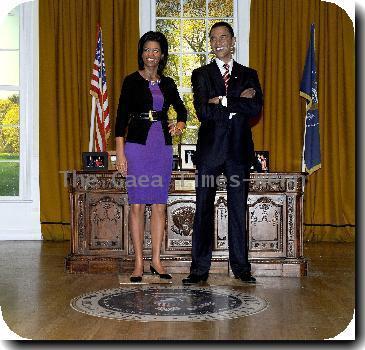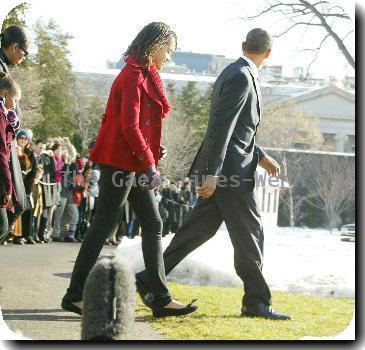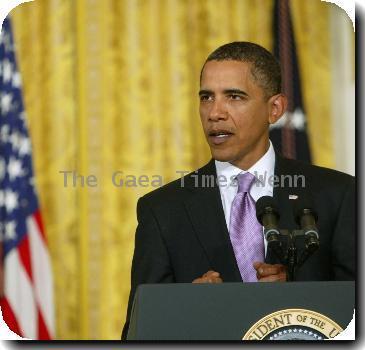Elders of town just seized from Taliban give Afghan president an earful on corruption, NATO
By Heidi Vogt, APSunday, March 7, 2010
Karzai gets an earful in town seized from Taliban
MARJAH, Afghanistan — Elders in a former Taliban stronghold berated and challenged Afghanistan’s president Sunday, delivering a litany of complaints about government corruption and NATO’s military operations on the Afghan leader’s first visit to Marjah.
President Hamid Karzai said that’s exactly what he had come to hear.
“Today, I’m here to listen to you and hear your problems,” Karzai told about 300 men who sat shoulder to shoulder on the floor of a mosque in central Marjah.
Thousands of U.S., NATO and Afghan troops seized the town of 80,000 people from the Taliban this month in a three-week offensive seen as a major test of a new strategy to win over Afghans by routing insurgents from population centers, setting up an effective civilian government and rushing in aid.
On Sunday, many of the assembled elders said they wanted to side with the government, but that their experience so far made them skeptical.
They complained — sometimes shouting — about corruption among former Afghan government officials. They lamented how schools in Marjah were turned into military posts by international forces. They said shops were looted during the offensive, and alleged that innocent civilians were detained by international forces.
“Over the past seven years we have suffered problems imposed by authorities,” said Abdullah, who only gave one name. Then, “in the past 20 days since the international forces have come here, people have been killed and wounded, our market has been destroyed, and houses destroyed.”
Seated on a cushion in his trademark peaked hat and a black suit, Karzai nodded as men in dusty tunics and long beards stood up at a podium next to him and catalogued grievances. Sometimes he interrupted their speeches to respond, or just to agree. Elders in the crowd occasionally stood up to correct the speakers.
The government’s task is to convince residents of the town in southern Helmand province that the civilian government can provide them with a better life than the Taliban. The Marjah push — the largest offensive since the 2001 ouster of the extremist group — was the first since President Barack Obama ordered 30,000 new American troops to try to reverse the Taliban’s momentum.
Mohammad Naeem Khan, in his early 30s, said his loyalty is to whoever will provide for him.
“If the Taliban tap me on the shoulder, I will be with them, and if the government taps me on my shoulder I will be with them,” Khan said.
In a message to The Associated Press, Taliban spokesman Qari Yousef Ahmadi said insurgents fired mortars into Marjah’s main intersection, but reporters traveling with Karzai and McChrystal did not witness any attack.
Three NATO service members were killed in attacks Sunday — one in the south and two in the east, the military alliance said in a statement. None was related to the Marjah offensive, in which 15 international forces have died.
At least 35 civilians have been killed in the operation, according to the Afghan human rights commission. Spokesman Nader Nadery said insurgent bombs killed more than 10 people, while NATO rocket fire killed at least 14.
Karzai and NATO commander Gen. Stanley McChrystal flew into Marjah aboard U.S. military helicopters, landing in a field near the town’s main market. McChrystal joined Karzai on the floor of the mosque, but did not speak during the nearly two-hour meeting.
The elders expressed outrage over house searches conducted by the military, and civilian casualties that occurred during the offensive. They told Karzai they want Afghan troops — not international forces or local policemen — searching houses. The men — some gesturing to express their frustration — also said they wanted clinics and schools, and were losing patience with the central government’s inability to provide services.
The president, who has been dubbed “the mayor of Kabul” by critics who claim his authority doesn’t extend beyond the capital, said the central government intends to be more responsive to the people’s needs.
“Are you against me or with me?” Karzai asked the elders. “Are you going to support me?”
The men all raised their hands and shouted: “We are with you. We support you.”
Karzai promised to provide them security, open schools and start building roads and clinics.
Marjah residents have heard promises before. International and Afghan forces have taken over Marjah at least three times previously. Those local governments failed to deliver on commitments to build clinics and schools. Marjah residents told the AP last month that police sent in 2009 were so corrupt locals drove them out — even before the Taliban returned.
While Karzai visited the south, armed clashes continued for a second day between the Taliban and another Islamist group in Baghlan province in northeastern Afghanistan. At least 50 miliants and an unknown number of civilians died in the battles between Taliban and the Hezb-e-Islami militia, loyal to regional warlord Gulbuddin Hekmatyar, provincial Gov. Mohammad Akbar Barakzai said.
Officials said the militants apparently were fighting over control of several villages where the government has almost no presence. It was unclear whether it was a local dispute or a rift between the insurgent groups.
Provincial police Chief Kabir Andarabi said more than 100 Hezb-e-Islami fighters, under pressure from the combat, pledged Sunday to join the government forces.
The regional police commander, Gen. Ghulam Mushtaba Patang, put the number of defections at 50 but said the situation was in flux. He said police set up mobile hospitals and were offering medical care to any fighters willing to defect.
At Karzai’s meeting with Marjah’s elders, many of the men said they did not want local police patrolling Marjah — they’d rather have officers from other parts of the country.
Karzai told reporters he was not surprised that the people in Marjah were angry.
“They had some very legitimate complaints — very, very legitimate,” he said. “They felt as though they were abandoned, which in many cases is true.”
McChrystal told reporters later that he did not feel that the elders’ complaints meant they were against international forces.
“What I heard today is frustrations,” McChrystal told reporters afterward. “But when you put it with what President Karzai said, I think what you find is there’s actually an extraordinary amount of support for what we are doing.”
It was unclear whether Karzai or McChrystal discussed the newly disclosed criminal record of the civilian administrator of Marjah, Abdul Zahir. Newly appointed to lead the government in the former Taliban stronghold, Zahir served part of a more than four-year prison sentence in Germany for stabbing his son in 1998.
Karzai said the Marjah residents told him they want to form a local council to help make decisions. He said it is important to work with the local population and listen to them, and that is what he intended to do.
“This is a chance that we got today,” Karzai said, adding that if the new administration in Marjah is unable to meet the people’s needs this time, “then we don’t deserve to call ourselves the government of Afghanistan.”
Tags: Afghanistan, As-afghanistan, Asia, Barack Obama, Central Asia, Marjah, Municipal Governments, North America, Political Corruption, Political Issues, United States







